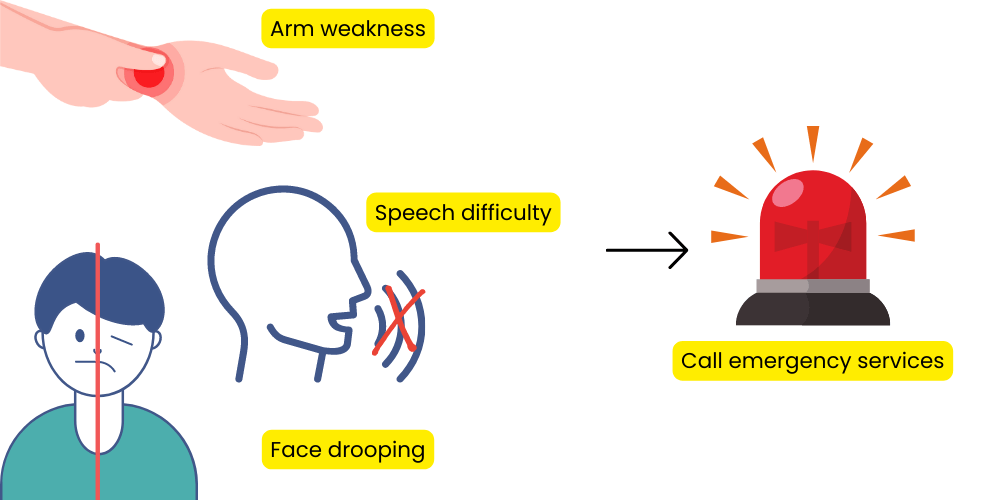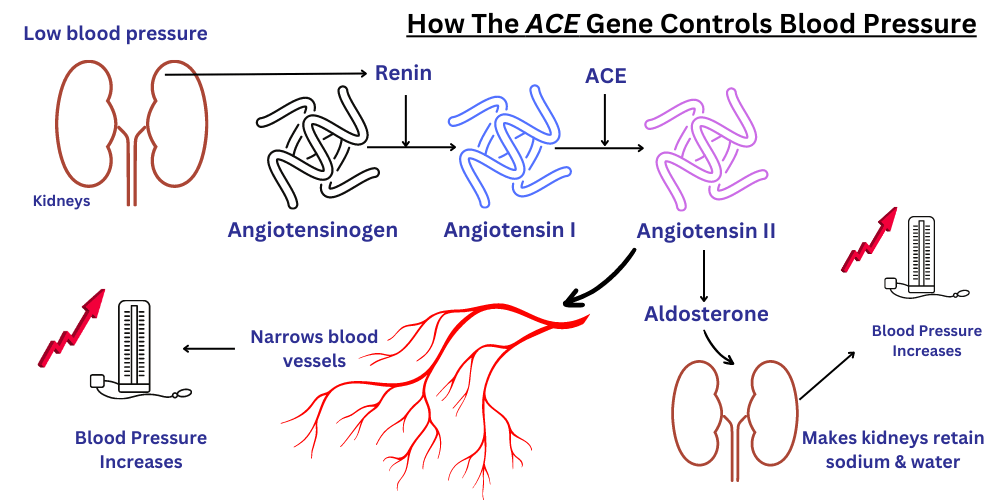Is Stroke Genetic? How Your DNA Raw Data Can Help You

Table of Contents
Strokes are one of the leading causes of disability and death worldwide. The good news is that many strokes can be prevented through lifestyle changes and medical treatments. Let’s dive into the world of stroke – its causes, symptoms, genetics, and how you can prevent it.
What is a Stroke?
A stroke occurs when the blood supply to a part of the brain is interrupted or reduced, depriving brain cells of oxygen and nutrients, which can cause brain cells to die. There are two main types of stroke: ischemic stroke, caused by blocked arteries, and hemorrhagic stroke, caused by bleeding into the brain.
How to Prevent a Stroke?
There are several ways to prevent a stroke. This includes maintaining a healthy diet, exercising regularly, quitting smoking, limiting alcohol, and controlling high blood pressure, high cholesterol, and diabetes.
What Does a Stroke Feel Like?
People who have experienced a stroke often describe it as feeling a sudden numbness or weakness on one side of the body. This may be accompanied by confusion, difficulty speaking, trouble seeing in one or both eyes and severe headache.
What are the Symptoms of Heat Stroke?
Heat stroke, a different condition from cerebrovascular stroke, is a serious heat-related illness that occurs when the body overheats, usually as a result of prolonged exposure to high temperatures. Symptoms may include high body temperature, altered mental state, alteration in sweating, nausea and vomiting, flushed skin, rapid breathing, and a racing heart rate.
What are the Signs of a Stroke?
The signs of a stroke can be remembered with the acronym FAST: Face drooping, Arm weakness, Speech difficulties, and Time to call emergency services. Other signs can include confusion, difficulty seeing, trouble walking, and severe headache.

What Causes a Stroke?
Strokes are usually caused by blocked arteries (ischemic stroke) or bleeding in the brain (hemorrhagic stroke). Risk factors include high blood pressure, smoking, diabetes, high cholesterol, obesity, cardiovascular disease, and previous stroke or transient ischemic attack (TIA).
Is Stroke Genetic?
Yes, genetics can play a role in the development of stroke. Researchers have identified numerous genes and genetic variants that are associated with an increased risk of stroke. These genes can influence a variety of biological processes, such as blood clotting, blood pressure regulation, inflammation, and lipid metabolism.
There are also certain genetic disorders that significantly increase the risk of stroke, such as CADASIL (Cerebral Autosomal Dominant Arteriopathy with Sub-cortical Infarcts and Leukoencephalopathy), a condition that damages blood vessels in the brain and can lead to multiple strokes.
However, stroke is a complex disease that is influenced by a combination of genetic and environmental factors. Lifestyle factors such as diet, physical activity, smoking, and alcohol use, as well as medical conditions like hypertension, diabetes, and heart disease, also play a significant role in stroke risk. This means that even if you have a genetic predisposition to stroke, it does not mean you will definitely have one. Lifestyle changes and medical treatments can often significantly reduce stroke risk.
Therefore, it’s important to discuss your individual risk factors, including potential genetic predispositions, with your healthcare provider to understand your overall stroke risk and the most effective prevention strategies for you.
What are the 5 Most Prominent Genes that Influence Stroke
Understanding the genetic factors influencing stroke can help identify individuals at higher risk and provide a framework for preventive strategies. Here, we delve into five key genes that have been linked to an increased risk of stroke.
APOE Gene
The APOE (Apolipoprotein E) gene plays a critical role in fat metabolism and has been strongly associated with cardiovascular disease and stroke, particularly the ischemic type. Different versions of this gene, known as ε2, ε3, and ε4, can affect an individual’s risk. Studies suggest that the ε4 variant might contribute to a higher risk of stroke by influencing cholesterol levels and promoting atherosclerosis.
MTHFR Gene
The MTHFR (methylenetetrahydrofolate reductase) gene is involved in the metabolism of homocysteine, an amino acid. Variations in this gene, particularly the C677T variant, can lead to elevated homocysteine levels, which have been linked to an increased risk of stroke and other cardiovascular diseases.
ACE Gene
The ACE (Angiotensin-Converting Enzyme) gene is a part of the Renin-Angiotensin System (RAS), which plays a crucial role in regulating blood pressure. A deletion/insertion (D/I) polymorphism in this gene can affect blood pressure levels, potentially influencing stroke risk.

NOS3 Gene
The NOS3 (Nitric Oxide Synthase 3) gene helps produce nitric oxide, a molecule that aids in the dilation of blood vessels, thereby regulating blood pressure. Variants in the NOS3 gene, such as the T-786C and Glu298Asp polymorphisms, have been associated with hypertension and ischemic stroke.
PDE4D Gene
The PDE4D (Phosphodiesterase 4D) gene is involved in several biological processes, including inflammation and cell signaling. Variations in this gene have been linked to an increased risk of ischemic stroke, particularly in younger individuals and those without traditional risk factors.
It’s important to remember that while these genetic variations can increase stroke risk, they are only one piece of the puzzle. Stroke is a complex disease influenced by a combination of genetic and environmental factors, including age, diet, physical activity, smoking, alcohol use, and other medical conditions.
SNP Table
| Gene | SNP | Risk Allele | Function |
|---|---|---|---|
| APOE | rs429358 | T | The ε4 allele, represented by the T risk allele, is associated with higher cholesterol levels and increased stroke risk. |
| MTHFR | rs1801133 | T | The T risk allele can lead to elevated homocysteine levels, a known risk factor for stroke. |
| ACE | rs4340 | D | The deletion (D) allele can affect blood pressure levels, potentially influencing stroke risk. |
| NOS3 | rs1799983 | T | The T allele has been associated with hypertension and ischemic stroke. |
| PDE4D | rs966221 | C | The C allele has been associated with an increased risk of ischemic stroke. |
Please note that this table is a simplified representation of the associations between these genetic variants and stroke risk. The actual risk can be influenced by other genetic and non-genetic factors, and it is always recommended to consult a healthcare provider for personalized advice.
Non-Genetic Factors Affecting Stroke
Non-genetic factors that increase stroke risk include age, gender, ethnicity, and lifestyle factors like diet, physical activity, smoking, and alcohol use. Medical conditions like high blood pressure, high cholesterol, diabetes, and cardiovascular diseases also significantly increase stroke risk.
How to Prevent Stroke Based on Your Genes
Genetics can certainly play a role in your risk for stroke, but knowing your genetic predispositions can help guide prevention strategies. Here, we delve into various strategies tailored to your genetic predispositions.
Monitor and Control Blood Pressure
High blood pressure is a significant risk factor for stroke. If you have a genetic predisposition for hypertension (such as variations in the AGT or ACE genes), it’s crucial to monitor and control your blood pressure regularly. This may involve lifestyle changes, such as reducing sodium intake and increasing physical activity, as well as medication if necessary.
Maintain Healthy Cholesterol Levels
Genes like APOE and CETP can influence cholesterol levels, impacting your stroke risk. Maintaining healthy cholesterol levels is key to reducing stroke risk. This may involve dietary changes, such as reducing saturated fat intake, increasing intake of omega-3 fatty acids, and potentially taking cholesterol-lowering medication if recommended by your healthcare provider.
Healthy Diet and Physical Activity
Obesity and poor diet can increase stroke risk, and some genes, such as FTO and MC4R, can influence weight regulation and eating behavior. Regular physical activity and a healthy diet rich in fruits, vegetables, whole grains, lean protein, and healthy fats can help maintain a healthy weight and lower stroke risk.
Regular Check-ups
If you have a genetic predisposition to stroke, it’s essential to have regular health check-ups. Your healthcare provider can monitor your blood pressure, cholesterol levels, and other risk factors. Regular monitoring can help understand how different genetic and environmental factors interact and guide preventative measures.
Avoid Harmful Habits
Tobacco and excessive alcohol use can increase stroke risk. If you have a genetic predisposition to addiction or substance use (such as variations in the DRD2 or ALDH2 genes), avoiding these substances can be particularly important.
Managing Comorbid Conditions
Genetic variants can also make you more susceptible to conditions that increase stroke risk, such as diabetes or atrial fibrillation. If you have these conditions, managing them effectively is crucial to reduce stroke risk. This can involve medication, lifestyle changes, and regular monitoring.
Remember that while genetics can influence stroke risk, many strokes are preventable through lifestyle changes and medical treatment. A genetic predisposition does not guarantee that you will have a stroke, but understanding your genetic risk can help guide prevention strategies.
Summary
-
What is a stroke?
A stroke occurs when the blood supply to a part of the brain is interrupted or reduced.
-
What are the signs of a stroke?
Signs of a stroke include facial drooping, arm weakness, and speech difficulties.
-
Is stroke preventable?
Many strokes are preventable through lifestyle changes and medical treatments.
-
What genes are linked to stroke?
Genes linked to stroke include APOE, MTHFR, ACE, NOS3, and PDE4D.
-
Can I prevent a stroke even if I have a high genetic risk?
Yes, healthy lifestyle choices can help prevent a stroke, regardless of genetic risk.
References
- World Health Organization. Stroke, Cerebrovascular accident.
- American Stroke Association. What is Stroke?
- Traylor M, Farrall M, Holliday EG, et al. Genetic risk factors for ischaemic stroke and its subtypes (the METASTROKE Collaboration): a meta-analysis of genome-wide association studies. Lancet Neurol. 2012;11(11):951-962.
- National Institute of Neurological Disorders and Stroke. Stroke Information Page.
- Casas JP, Hingorani AD, Bautista LE, Sharma P. Meta-analysis of genetic studies in ischemic stroke: thirty-two genes involving approximately 18,000 cases and 58,000 controls. Arch Neurol. 2004;61(11):1652-1661.
- Dichgans M. Genetics of ischaemic stroke. Lancet Neurol. 2007;6(2):149-161.
- Meschia JF, Bushnell C, Boden-Albala B, et al. Guidelines for the primary prevention of stroke: a statement for healthcare professionals from the American Heart Association/American Stroke Association. Stroke. 2014;45(12):3754-3832.
- Seshadri S, Beiser A, Kelly-Hayes M, et al. The lifetime risk of stroke: estimates from the Framingham Study. Stroke. 2006;37(2):345-350.
Written By
Share this article












